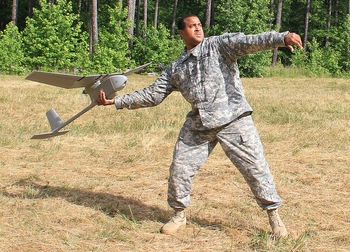May 7 2013
The problem with the ongoing backlash by U.S. privacy advocates against drones is that drones aren’t really the problem, argues ASU’s Brad Allenby, Lincoln Professor of Engineering and Ethics and founding chair of the Consortium for Emerging Technologies, Military Operations, and National Security.
 Hand-launched, battery-powered drones like this one used by the Virginia National Guard have touched off cultural, ethical and political hysteria in the United States. Photo by flickr/Virginia Guard Public Affairs
Hand-launched, battery-powered drones like this one used by the Virginia National Guard have touched off cultural, ethical and political hysteria in the United States. Photo by flickr/Virginia Guard Public Affairs
Instead, drones have become a symbol for the end of the “golden age of privacy” and widespread fears about big data, ubiquitous video recording and a host of other technologies that portend a future in which privacy is nonexistent.
“Fear of drones ... becomes a reactionary spasm against the present, rather than a reasoned response to the marginal challenge that drones actually represent to what little privacy remains,” writes Allenby in a recent Future Tense article in Slate magazine.
Allenby says that public debates about emerging technologies like drones should begin before they morph into cultural symbols for larger hopes, fears and anxieties. Assessments of how technologies should be regulated and implemented “need to be part of the technology development process from the beginning.”
Future Tense is a collaboration among ASU, the New America Foundation and Slate magazine that explores how emerging technologies affect policy and society.